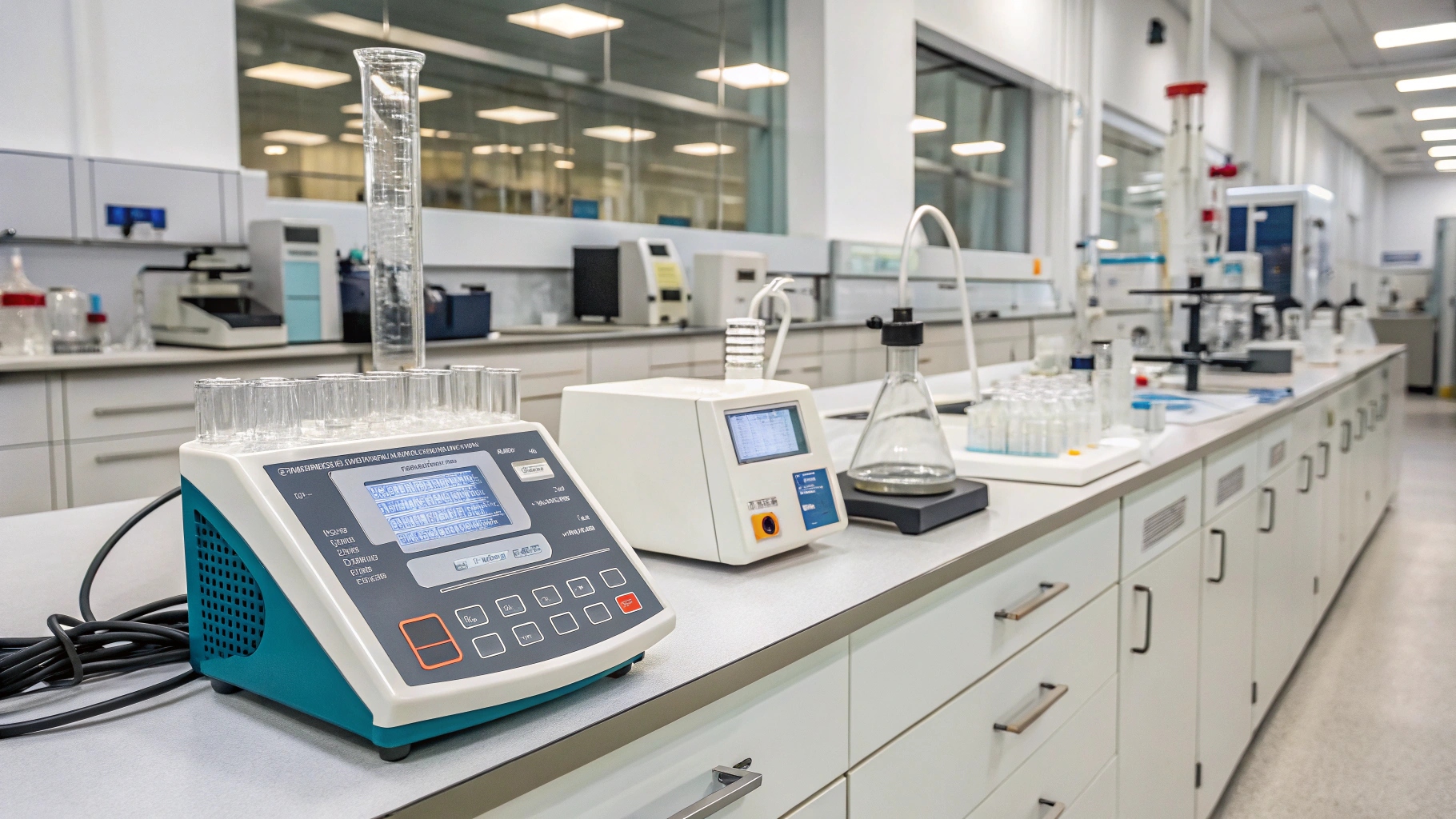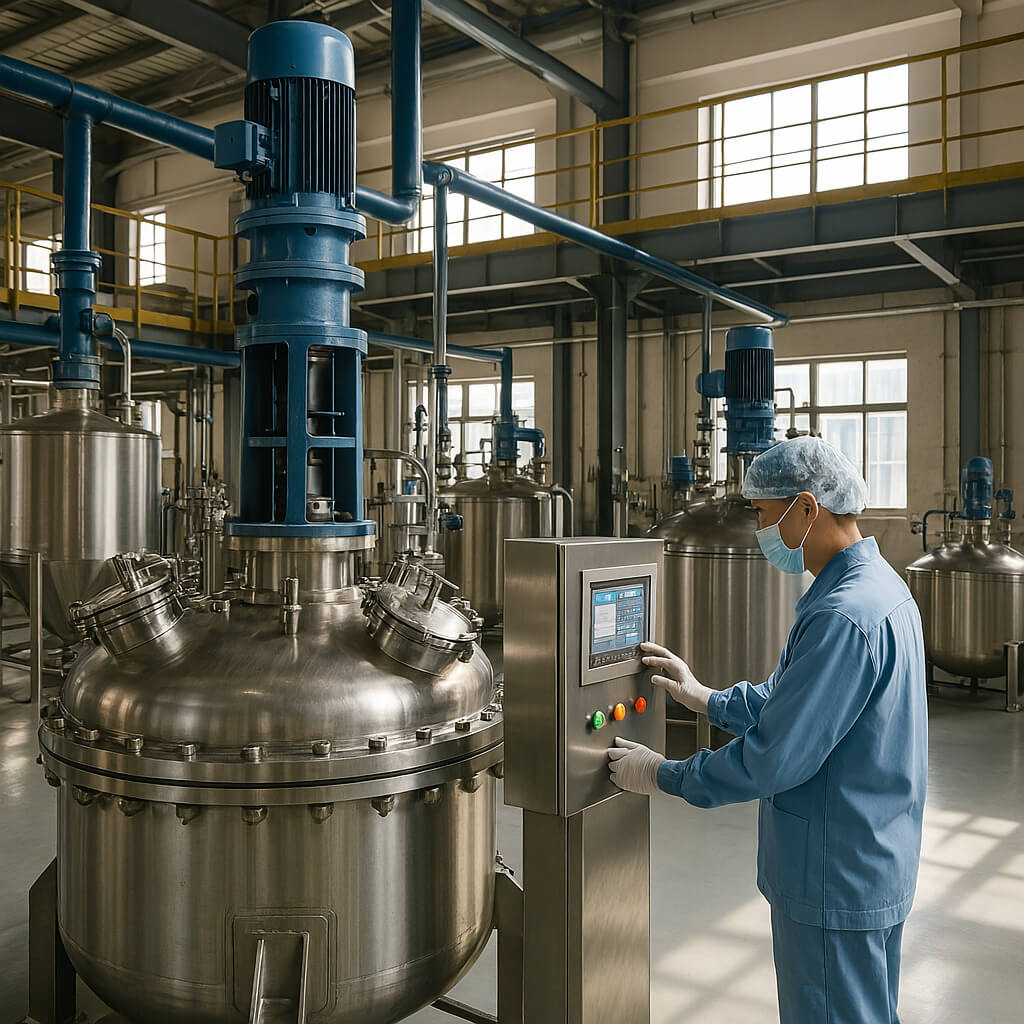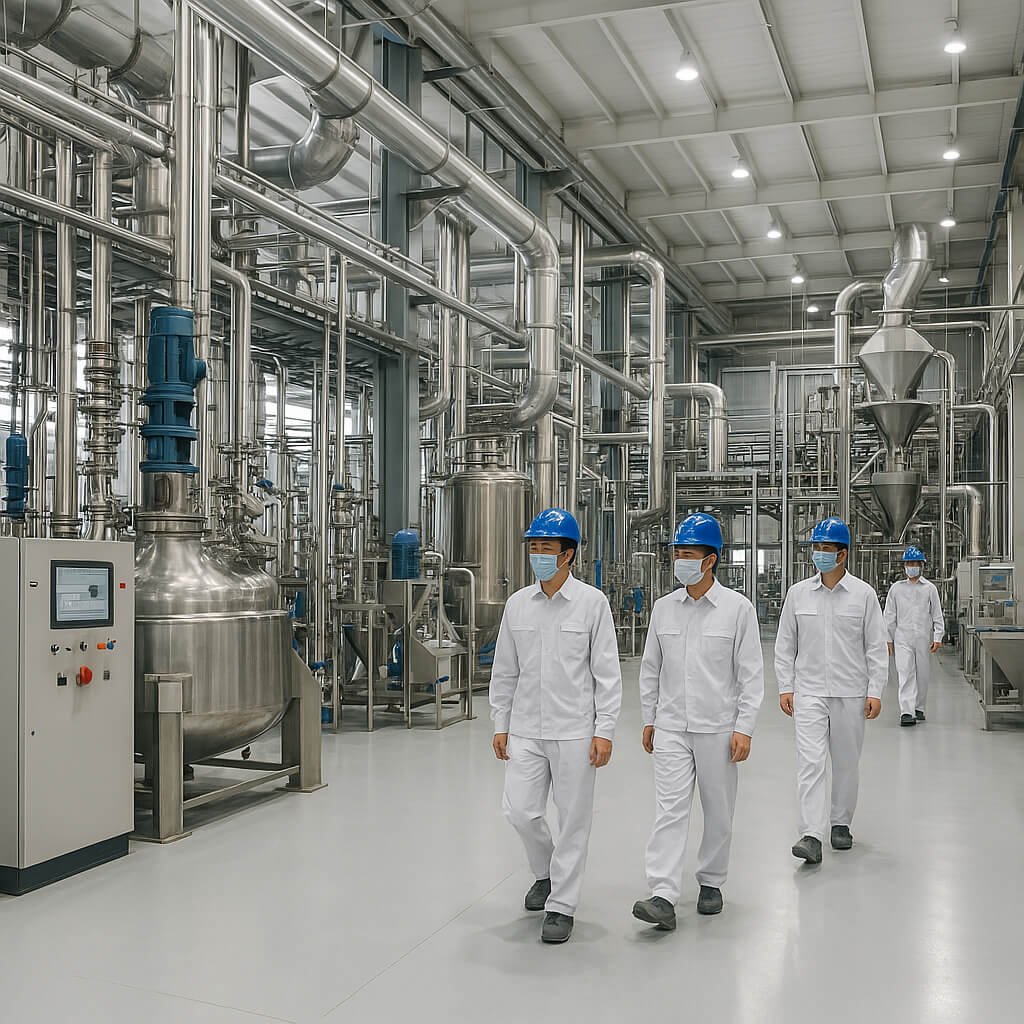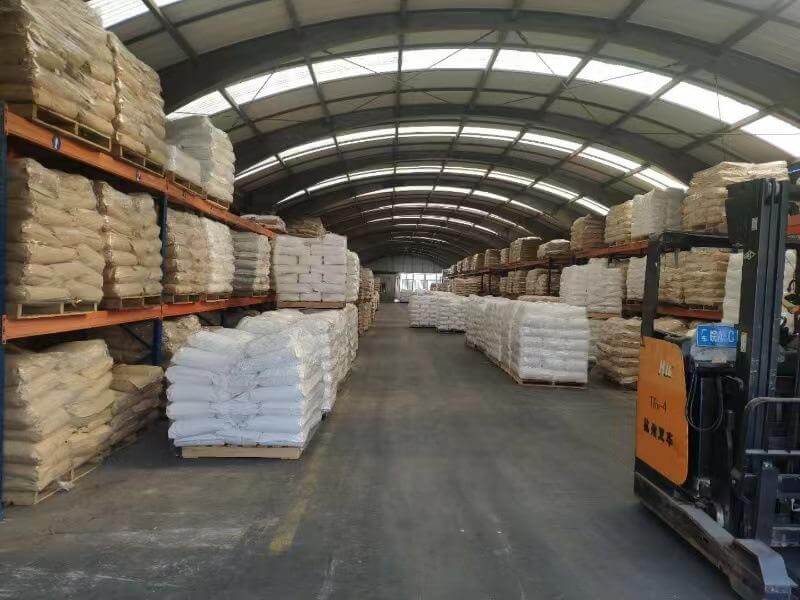HPMC (Hydroxypropyl Methylcellulose) plays a crucial role in various industries, from construction and pharmaceuticals to food production. But selecting the right supplier isn't easy. Low-quality HPMC can cause formulation failures, inconsistent performance, and increased production costs. So, how do you determine which manufacturers provide the best quality?
A high-quality HPMC manufacturer ensures strict compliance with global standards, delivers consistent viscosity levels, and provides detailed testing reports. Key factors include certifications (USP, EP, JP), supply chain stability, and customer service reliability.

State-of-the-art HPMC production facility, showcasing advanced quality control testing in progress.
Choosing the right supplier requires careful evaluation of production standards, supply consistency, and regulatory compliance. Let's break down what defines a top-tier HPMC manufacturer and which companies are leading the market.
What Defines a High-Quality HPMC Manufacturer?
Finding the right HPMC manufacturer can be challenging. Many suppliers claim high quality, but not all deliver on that promise. If your chosen supplier lacks consistency, it can lead to performance issues, supply chain disruptions, and increased costs.
Key Characteristics of a High-Quality HPMC Manufacturer
A top-tier HPMC manufacturer consistently meets industry standards, maintains strict quality control, and ensures product reliability. Here’s what sets them apart:
-
Compliance with Global Standards
- Must meet USP, EP, JP, and other international pharmaceutical and food-grade certifications.
- Adheres to REACH and FDA regulations where applicable.
- Provides detailed COA (Certificate of Analysis) and third-party testing reports.
-
Consistent Product Quality
- Maintains tight viscosity control within specified tolerances.
- Ensures batch-to-batch consistency, avoiding fluctuations in formulation performance.
- Utilizes advanced filtration and purification processes to remove impurities.
-
Reliable Supply Chain & Production Capacity
- Operates state-of-the-art production facilities with automated processes.
- Maintains sufficient production capacity to fulfill large-scale orders.
- Offers flexible production schedules to accommodate custom requirements.
-
Strong R&D and Technical Support
- Provides technical support for formulation troubleshooting.
- Invests in continuous research to improve product performance and develop new applications.
- Customizes HPMC grades based on client-specific needs.
-
Proven Industry Reputation
- Serves global clients across multiple industries, including construction, pharmaceuticals, and food processing.
- Has a long-standing track record of successful product applications.
- Receives positive customer feedback and third-party endorsements.
| Factor | Why It Matters |
|---|---|
| Certifications | Ensures compliance with industry and safety regulations. |
| Batch Consistency | Reduces formulation failures and improves product performance. |
| Production Capacity | Guarantees stable supply and minimizes lead time risks. |
| Technical Support | Helps resolve application challenges and optimize formulations. |
| Reputation & Experience | Indicates reliability and long-term commitment to quality. |
Selecting an HPMC supplier without these characteristics can lead to unreliable formulations, increased rejection rates, and supply disruptions. The next step? Understanding how to evaluate a manufacturer’s claims before making a commitment.
How to Evaluate an HPMC Manufacturer’s Quality?
Not all HPMC manufacturers maintain the same level of quality. Choosing the wrong supplier can lead to costly product failures, batch inconsistencies, and regulatory issues. How can you verify a manufacturer’s quality before committing to a long-term partnership?
Key Factors to Assess an HPMC Manufacturer’s Quality
A high-quality HPMC manufacturer adheres to strict production standards, delivers consistent performance, and provides third-party validation. Here’s how you can systematically evaluate a supplier:
1. Certifications & Compliance
Regulatory approvals and certifications are the first indicators of quality. Verify if the manufacturer complies with:
- USP, EP, JP, and CP standards for pharmaceutical-grade HPMC.
- REACH and FDA approvals for food and personal care applications.
- ISO 9001 and GMP (Good Manufacturing Practice) certification for strict quality control.
2. Batch Consistency & Quality Control Measures
A reliable supplier ensures consistency in viscosity, moisture content, and particle size. Key evaluation steps:
- Request batch-to-batch COA (Certificate of Analysis) reports to verify stability.
- Ask for sample testing and compare results with specifications.
- Investigate the manufacturer’s in-house testing procedures, including rheological analysis and impurity control.
3. Raw Material Sourcing & Production Process
The quality of raw materials directly impacts HPMC performance. Assess:
- Source of cellulose – High-purity plant-derived cellulose ensures better product stability.
- Purification & filtration techniques – Manufacturers using advanced purification methods produce low-residue, high-purity HPMC.
- Consistency in production processes – Automated production lines reduce variability and contamination risks.
4. Technical Support & Documentation
A reputable manufacturer provides comprehensive technical support and transparent documentation. Essential criteria:
- Availability of formulation assistance and troubleshooting services.
- Detailed safety data sheets (SDS), technical datasheets (TDS), and handling guidelines.
- Proven track record of working with major industry players.
5. Global Reputation & Client Feedback
Manufacturer credibility is reflected in customer satisfaction, market presence, and industry partnerships. Ways to evaluate:
- Check customer reviews and testimonials from long-term buyers.
- Look for case studies or application success stories.
- Assess export markets – Manufacturers with global reach often maintain higher quality standards.
| Evaluation Criteria | What to Look For |
|---|---|
| Certifications & Standards | USP, EP, JP, ISO, REACH, FDA approvals. |
| Batch Consistency | COA reports, viscosity control, impurity levels. |
| Raw Material Quality | High-purity cellulose sources, purification methods. |
| Production Process | Automated systems, advanced filtration, quality checks. |
| Technical Support | Application guidance, formulation assistance. |
| Reputation & Feedback | Client testimonials, global market presence. |
A thorough evaluation process protects your business from supply disruptions, performance failures, and non-compliant formulations. Next, let’s explore the top HPMC manufacturers leading the market today.
Top HPMC Manufacturers in the Market
The HPMC industry is dominated by a few key manufacturers known for consistent quality, advanced production capabilities, and global distribution networks[^1]. Choosing a reputable supplier ensures stable formulations, compliance with industry standards, and uninterrupted supply chains.
[^1]: Learn how global distribution networks enhance supply chain efficiency and product availability in the manufacturing sector.
Leading HPMC Manufacturers & Their Strengths
Below is a comparison of top HPMC manufacturers worldwide, highlighting their core competencies, industry focus, and global presence.
| Manufacturer | Country | Key Strengths | Industries Served |
|---|---|---|---|
| Ashland | USA | High-purity pharmaceutical-grade HPMC | Pharmaceuticals, Personal Care |
| Dow Chemical | USA | Advanced polymer expertise, broad applications | Construction, Coatings, Pharmaceuticals |
| Shin-Etsu Chemical | Japan | Strict quality control, specialty formulations | Pharmaceuticals, Food, Industrial |
| LOTTE Fine Chemical | South Korea | High-purity cellulose ether, strong R&D | Pharmaceuticals, Food, Construction |
| Morton | China | Customizable formulations, cost-effective solutions | Construction, Pharmaceuticals, Food, Industrial |
| Shandong Head Co. | China | Large-scale production, competitive pricing | Construction, Paints, Adhesives |
| Anhui Ruitai | China | Bulk supplier, strong regional presence | Construction, Paints, Coatings |
Key Considerations When Comparing Manufacturers
-
Industry Compliance & Certifications
- Pharmaceutical suppliers should meet USP, EP, JP standards.
- Construction and food-grade HPMC must comply with ISO, REACH, FDA regulations.
-
Batch Consistency & Quality Control
- Global brands like Shin-Etsu and Dow invest heavily in advanced quality control.
- Chinese manufacturers, such as Morton and Shandong Head, provide cost-effective alternatives with reliable batch consistency.
-
Customization & Technical Support
- Ashland and Shin-Etsu specialize in high-performance pharmaceutical formulations.
- Morton offers flexible customization, making it a preferred choice for construction and industrial applications.
-
Supply Chain & Pricing
- Chinese manufacturers dominate due to efficient production and cost advantages.
- Dow Chemical and LOTTE Fine Chemical cater to premium markets with specialized formulations.
Why Manufacturer Selection Matters
Choosing the wrong HPMC manufacturer can lead to inconsistent product performance, delayed shipments, and higher costs. A strategic supplier partnership ensures reliable product quality, stable pricing, and long-term business success.
With Chinese manufacturers gaining global market share, let’s examine why they are leading the industry.
Why Are Chinese HPMC Manufacturers Dominating the Market?
For years, Chinese HPMC manufacturers have been expanding their global footprint, supplying industries ranging from construction and pharmaceuticals to food and cosmetics. But what gives them an edge over competitors from the USA, Japan, and Europe?
Key Reasons Behind China’s Market Dominance
1. Cost-Effective Production & Competitive Pricing
- Lower labor and raw material costs allow Chinese manufacturers to produce HPMC at a fraction of the price compared to Western counterparts.
- Large-scale production facilities optimize costs while maintaining quality.
- Flexible pricing models accommodate both bulk buyers and niche applications.
2. Strong Supply Chain & Manufacturing Capacity
- China is the largest producer of cellulose ethers, the base material for HPMC.
- Integrated supply chains ensure consistent raw material availability.
- High production volumes allow manufacturers to fulfill large global orders efficiently.
3. Advanced Technology & Quality Control
- Chinese manufacturers now invest in R&D and automation to improve consistency and meet global standards.
- Companies like Morton and Shandong Head maintain ISO, USP, EP, and JP certifications, making their HPMC suitable for pharmaceutical and food applications.
- Strict quality control measures, including viscosity monitoring and impurity filtration, enhance product reliability.
4. Customization & Industry-Specific Solutions
- Western manufacturers focus on standardized grades, while Chinese suppliers offer tailored solutions for various applications.
- Companies like Morton specialize in viscosity customization, dissolution rate adjustments, and formulation enhancements.
- Flexible manufacturing processes make Chinese suppliers ideal for industries requiring precise material specifications.
5. Strategic Global Expansion
- Aggressive market penetration into Europe, North America, and the Middle East.
- Competitive pricing strategies make Chinese manufacturers the preferred suppliers for construction, pharmaceuticals, and food industries.
- Improved logistics and export efficiency ensure timely delivery worldwide.
| Factor | China's Competitive Advantage |
|---|---|
| Cost Efficiency | Lower labor & raw material costs |
| Production Capacity | High-volume output, strong supply chains |
| Quality Control | Advanced testing, global certifications |
| Customization | Tailored solutions for diverse industries |
| Global Reach | Strong export network, competitive pricing |
The Shift in Global HPMC Procurement
With consistent quality improvements, customization options, and cost advantages, Chinese manufacturers are becoming the first choice for buyers worldwide.
Now, how do you ensure you’re selecting the right HPMC supplier for your business needs? Let’s explore the key factors in making the best choice.
How to Choose the Best HPMC Supplier for Your Business Needs?
Choosing the right HPMC supplier is a critical decision that impacts product performance, cost efficiency, and long-term business success. A poor choice can result in inconsistent quality, supply chain disruptions, and higher operational costs. So, what factors should guide your selection process?
Key Criteria for Selecting the Best HPMC Supplier
1. Product Quality & Certification Compliance
- Ensure the supplier meets global standards such as USP, EP, JP, and REACH.
- Verify batch consistency through COA reports, viscosity tests, and third-party lab certifications.
- Confirm stringent quality control measures, including impurity removal and formulation stability.
2. Supply Chain Reliability & Production Capacity
- Check if the supplier has stable access to high-purity cellulose raw materials.
- Assess their production scale and delivery capacity to prevent delays.
- Opt for suppliers with multiple production sites to mitigate risks of supply chain disruptions.
3. Customization & Technical Support
- Look for suppliers offering customized viscosity levels, dissolution rates, and formulation assistance.
- Verify if they provide technical support for product applications and troubleshooting.
- Ensure they have R&D capabilities for continuous product improvement.
4. Pricing & Cost-Effectiveness
- Compare unit pricing, bulk discounts, and long-term contract flexibility.
- Consider total cost factors such as logistics, import duties, and after-sales support.
- Ensure pricing stability to avoid unexpected fluctuations in procurement costs.
5. Reputation & Industry Experience
- Research customer testimonials, industry reputation, and global client base.
- Consider suppliers with a proven track record in construction, pharmaceuticals, and food industries.
- Look for companies that collaborate with established brands and maintain long-term partnerships.
| Selection Criteria | What to Look For |
|---|---|
| Certifications & Compliance | USP, EP, JP, ISO, REACH, FDA approvals |
| Supply Reliability | Stable raw material sourcing, large-scale production |
| Customization Options | Tailored viscosity, dissolution rates, technical support |
| Pricing & Cost | Transparent pricing, bulk discounts, supply chain cost savings |
| Reputation & Experience | Strong industry presence, global client base |
Why Supplier Selection Matters
A high-quality HPMC supplier ensures consistent formulations, uninterrupted production, and regulatory compliance. Selecting an unreliable supplier can lead to rejected batches, customer complaints, and increased operational risks.
With the industry evolving rapidly, it’s essential to stay updated on emerging trends in HPMC production and applications. Let’s explore the latest developments shaping the market.
What Are the Latest Trends in the HPMC Industry?
The HPMC market is evolving rapidly, driven by technological advancements, sustainability demands, and shifting industry applications. Companies that stay ahead of these trends gain a competitive edge by offering innovative, high-quality, and cost-effective solutions.
1. Growing Demand for Sustainable & Bio-Based HPMC
- Environmental concerns are pushing manufacturers to adopt eco-friendly production processes.
- Bio-based cellulose sources are being explored to reduce reliance on chemically processed materials.
- Sustainability certifications such as ISO 14001 and EU REACH compliance are becoming essential for market acceptance.
2. Increased Use of HPMC in Pharmaceuticals & Food Industry
- Pharmaceutical-grade HPMC is gaining traction as a safer alternative to gelatin-based capsules.
- The food industry is increasing its reliance on HPMC as a stabilizer and thickener in plant-based and dairy-free products.
- Stringent FDA and EFSA regulations are influencing formulation adjustments to enhance food safety.
3. Advanced Manufacturing Techniques for Higher Purity & Consistency
- Automation and AI-driven production are being integrated to enhance batch consistency and reduce impurities.
- Improved filtration and refinement processes are yielding higher viscosity stability for pharmaceutical and construction applications.
- China’s leading HPMC manufacturers are investing in fully automated production lines to meet global quality expectations.
4. Expansion of HPMC Applications in Construction & Industrial Coatings
- The construction industry is increasingly using HPMC for self-leveling cement, high-strength tile adhesives, and waterproof coatings.
- Industrial coatings and paints are incorporating HPMC as a rheology modifier to improve durability and application performance.
- With the global construction boom, demand for high-viscosity and fast-dissolving HPMC grades is expected to rise.
5. Rising Competition Among Global HPMC Manufacturers
- Chinese manufacturers are challenging Western suppliers by offering competitive pricing and high product quality.
- Shin-Etsu (Japan), Dow Chemical (USA), and LOTTE (South Korea) continue to dominate the high-end market.
- Companies like Morton and Shandong Head are gaining global market share due to cost-effectiveness and advanced formulations.
| Trend | Impact on the HPMC Industry |
|---|---|
| Sustainability & Bio-Based HPMC | Higher demand for eco-friendly formulations |
| Pharmaceutical & Food Growth | More FDA & EFSA-compliant HPMC solutions |
| Automation in Manufacturing | Improved purity, viscosity stability, and production efficiency |
| Construction & Industrial Expansion | Increased use in self-leveling cement, paints, coatings |
| Global Market Competition | Chinese manufacturers gaining market share |
Adapting to Industry Shifts
As HPMC applications expand and quality expectations rise, businesses must align with trusted suppliers who invest in innovation, sustainability, and consistency.
With these trends shaping the future, selecting a supplier that stays ahead of industry advancements is key to long-term success. Let’s summarize the critical takeaways and the best next steps for your HPMC sourcing strategy.
Conclusion
Selecting the right HPMC manufacturer is crucial for ensuring product quality, regulatory compliance, and supply chain stability. A reliable supplier provides consistent formulations, supports industry-specific needs, and helps businesses adapt to evolving market demands.
Key Takeaways:
- Top HPMC manufacturers adhere to strict quality standards like USP, EP, JP, and REACH.
- Chinese suppliers dominate due to cost advantages, high production capacity, and customization options.
- Critical selection criteria include batch consistency, technical support, and supply reliability.
- Emerging trends such as bio-based HPMC, automation, and pharmaceutical-grade applications are reshaping the industry.
Next Steps for Businesses
If you're sourcing HPMC for construction, pharmaceuticals, food, or industrial applications, working with a trusted, certified supplier is essential. Choosing the right partner minimizes risks, improves efficiency, and ensures long-term success.
Looking for a high-quality HPMC supplier? Contact us today to discuss your requirements and get expert guidance.
FAQ
What are the different grades of HPMC?
HPMC is available in various grades based on viscosity, substitution levels, and intended applications. The main categories include:
- Construction-Grade HPMC – Used in tile adhesives, cement-based mortars, and self-leveling compounds for improved water retention and workability.
- Pharmaceutical-Grade HPMC – Meets USP, EP, and JP standards, widely used as a binder in tablets and as a capsule-forming agent.
- Food-Grade HPMC – Used as a thickener, emulsifier, and stabilizer in plant-based foods and dairy alternatives.
- Personal Care & Industrial HPMC – Found in cosmetics, coatings, paints, and adhesives for viscosity control and film formation.
Who is the manufacturer of HPMC?
Several global manufacturers produce HPMC for different industries. Some leading suppliers include:
- Dow Chemical (USA) – High-performance cellulose ethers for pharmaceuticals and construction.
- Shin-Etsu Chemical (Japan) – Premium-grade HPMC for pharmaceutical, food, and industrial applications.
- LOTTE Fine Chemical (South Korea) – Advanced formulations for pharmaceutical and food applications.
- Ashland (USA) – Specializes in pharmaceutical-grade and personal care HPMC solutions.
- Chinese manufacturers (Morton, Shandong Head, Anhui Ruitai) – Leading suppliers of cost-effective, high-quality HPMC for construction, coatings, and pharmaceuticals.
Which is better, CMC or HPMC?
The choice between CMC (Carboxymethyl Cellulose) and HPMC depends on the application:
- HPMC offers better thermal stability, water retention, and film-forming properties, making it ideal for construction materials, coatings, and pharmaceuticals.
- CMC is more water-soluble and widely used in food, detergents, and papermaking but lacks the high viscosity and stability of HPMC in industrial applications.
- HPMC is preferred in construction and pharmaceuticals, while CMC is commonly used in food and industrial processes.
What is the difference between HPMC K and E series?
The K and E series of HPMC differ in methoxy and hydroxypropyl substitution levels, affecting their solubility, viscosity, and gelation properties:
- HPMC K-Series – Higher gelation temperature, making it suitable for construction applications (tile adhesives, cement-based products) and pharmaceutical coatings.
- HPMC E-Series – Lower gelation temperature, widely used in pharmaceutical formulations, food-grade applications, and industrial coatings.
- Both grades are used in different industries, with K-Series excelling in construction and E-Series preferred for pharmaceuticals and food products.




